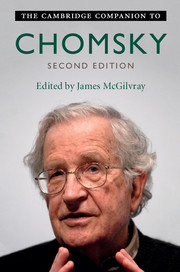Book contents
- The Cambridge Companion to Chomsky
- The Cambridge Companion to Chomsky
- Copyright page
- Dedication
- Contents
- Figures
- Contributors
- Introduction
- Part I The Science of Language: Recent Change and Progress
- 1 The Locality of Transformational Movement: Progress and Prospects
- 2 Is the Faculty of Language a “Perfect Solution” to the Interface Systems?
- 3 On Merge
- 4 A Feeling for the Phenotype
- 5 The Generative Word
- 6 Third Factors in Language Design: Some Suggestions from Quantum Field Theory
- Part II The Human Mind and Its Study
- Part III Chomsky on Politics and Economics
- Index
- References
5 - The Generative Word
from Part I - The Science of Language: Recent Change and Progress
Published online by Cambridge University Press: 13 July 2017
- The Cambridge Companion to Chomsky
- The Cambridge Companion to Chomsky
- Copyright page
- Dedication
- Contents
- Figures
- Contributors
- Introduction
- Part I The Science of Language: Recent Change and Progress
- 1 The Locality of Transformational Movement: Progress and Prospects
- 2 Is the Faculty of Language a “Perfect Solution” to the Interface Systems?
- 3 On Merge
- 4 A Feeling for the Phenotype
- 5 The Generative Word
- 6 Third Factors in Language Design: Some Suggestions from Quantum Field Theory
- Part II The Human Mind and Its Study
- Part III Chomsky on Politics and Economics
- Index
- References
- Type
- Chapter
- Information
- The Cambridge Companion to Chomsky , pp. 110 - 133Publisher: Cambridge University PressPrint publication year: 2017
References
- 11
- Cited by

